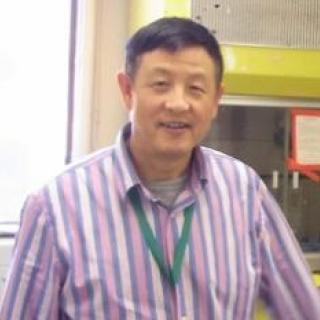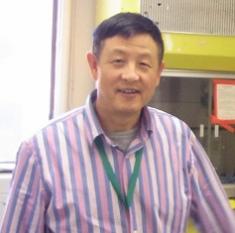
Keqiang Chen, Ph.D.
- Center for Cancer Research
- National Cancer Institute
- Building 560, Room 31-76
- Frederick, MD 21702-1201
- 301-846-6738
- chenkeq@nih.gov
RESEARCH SUMMARY
Immune cell infiltration is a hallmark in cancer and inflammation and is mediated by G-protein coupled receptors (GPCRs) recognizing pathogen-, tumor- and host-derived chemoattractants. Some chemoattractant GPCRs are also expressed by malignant tumor cells and promote tumor progression. My current research focuses on three major areas to elucidate: 1) the mechanisms by which chemoattractant GPCRs contribute to colonic epithelial homeostasis, inflammation, and tumorigenesis; 2) the mechanisms by which chemoattractant GPCRs regulate the function of myeloid cells in inflammation and anti-tumor host defense; 3) the mechanisms by which chemoattractant GPCRs regulate host and microbiome interaction.
Areas of Expertise

Keqiang Chen, Ph.D.
Research
Formylpeptide receptors (FPRs in human; Fprs in mice) belong to seven-transmembrane, G-protein coupled receptors (GPCRs) family and recognize a range of pathogen-, tumor- and host-derived chemoattractant agonists, suggesting a critical role of these receptors in homeostasis and diseases.
Our team has developed mouse strains deficient in one or two Fprs that enabled studies of the role of these receptors in vivo. Mice deficient in one Fprs, Fpr2, exhibited severely reduced innate and adaptive immune responses in allergic airway inflammation associated with impaired trafficking of antigen presenting dendritic cells (DCs) into the inflamed tissue and draining lymph nodes. Fpr2 was also found to mediate the “step wised” trafficking of myeloid cells in bacterial infection and inflammation.
Our team further found that Fpr2 is expressed on the apical and lateral membranes of colonic crypt epithelial cells to mediate N-formylpeptide–dependent cell proliferation and renewal. Colonic epithelial cells in Fpr2-deficient mice displayed defects in commensal bacterium–dependent homeostasis as shown by the absence of responses to N-formylpeptide stimulation, shortened colonic crypts, reduced acute inflammatory responses to dextran sulfate sodium (DSS) challenge, delayed mucosal restoration after injury, and increased azoxymethane-induced tumorigenesis. These observations indicate that Fpr2 is essential for mediating homeostasis, inflammation, and epithelial repair processes in the colon.
My current research focuses on three major areas: 1) The contribution of chemoattractant GPCRs and ligands to colonic epithelial homeostasis, inflammation, and tumorigenesis; 2) Regulation of the function of myeloid cells in inflammation and anti-tumor host defense by chemoattractant GPCRs; 3) Involvement of chemoattractant GPCRs in host and microbiome interaction.
Publications
A critical role for the g protein-coupled receptor mFPR2 in airway inflammation and immune responses
Formylpeptide receptor-2 contributes to colonic epithelial homeostasis, inflammation, and tumorigenesis
Signal relay by CC chemokine receptor 2 (CCR2) and formylpeptide receptor 2 (Fpr2) in the recruitment of monocyte-derived dendritic cells in allergic airway inflammation
The formylpeptide receptor 2 (Fpr2) and its endogenous ligand cathelin-related antimicrobial peptide (CRAMP) promote dendritic cell maturation
Tissue-resident dendritic cells and diseases involving dendritic cell malfunction
Biography

Keqiang Chen, Ph.D.
Dr. Keqiang Chen obtained his Ph.D. degree in Etiologic Biology from the Second Military Medical University, Shanghai, China, in 2001. In 2002-2003, Dr. Chen studied as a Postdoctoral Fellow at the Medical Center at University of Rochester, NY, USA. In 2004, Dr. Chen joined Dr. Ji Ming Wang’s laboratory in Cancer and Inflammation Program at NCI-Frederick as a Visiting Fellow. In September 2009, Dr. Chen was promoted to the position of Research Fellow at NCI-Frederick. From November 2012, Dr. Chen worked as a Research Scientist at the Department of Biological Sciences, College of Sciences, Virginia Polytechnic Institute and State University (Virginia Tech), in Blacksburg, VA. Dr. Chen was recruited as a Staff Scientist to the Cancer and Inflammation Program, Center for Cancer Research, NCI-Frederick, in June 2016, pursuing his studies of chemoattractant GPCRs in inflammation, immune responses and cancer.